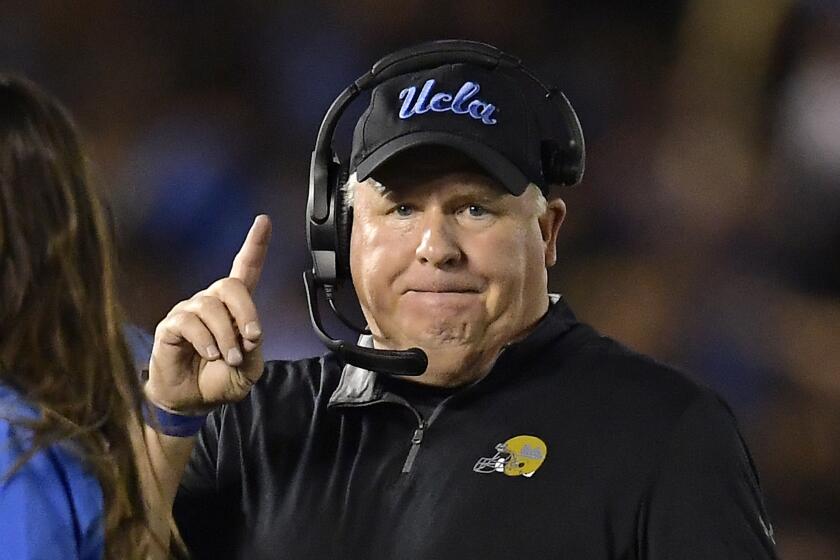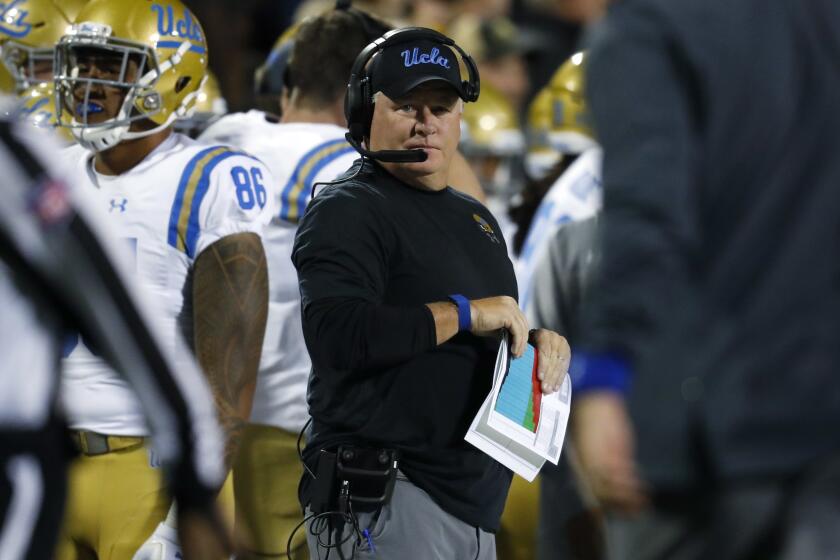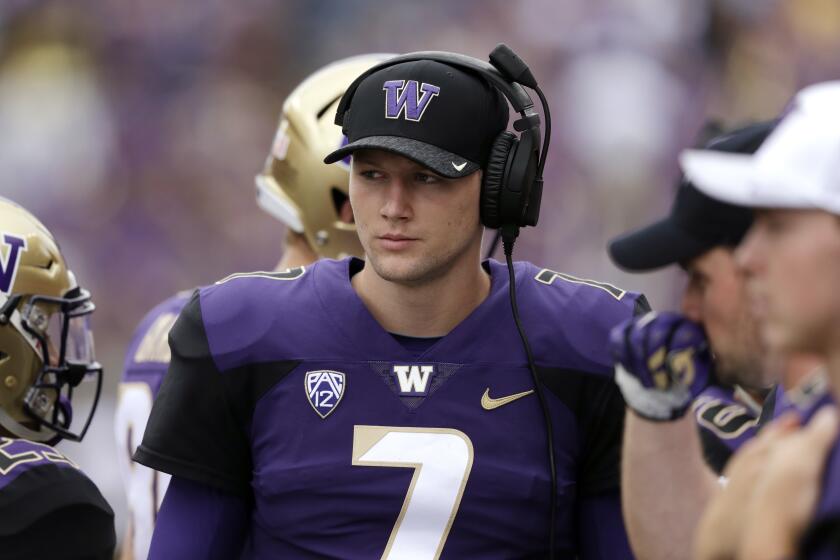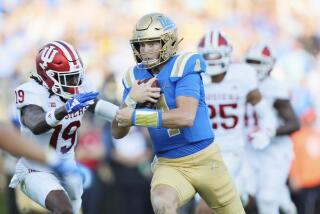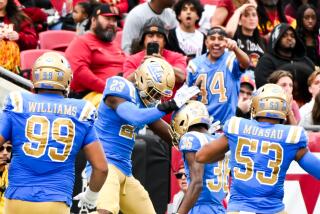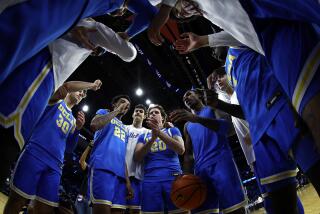Having kept virus away, UCLA hopes ‘Bruin Bubble’ won’t burst
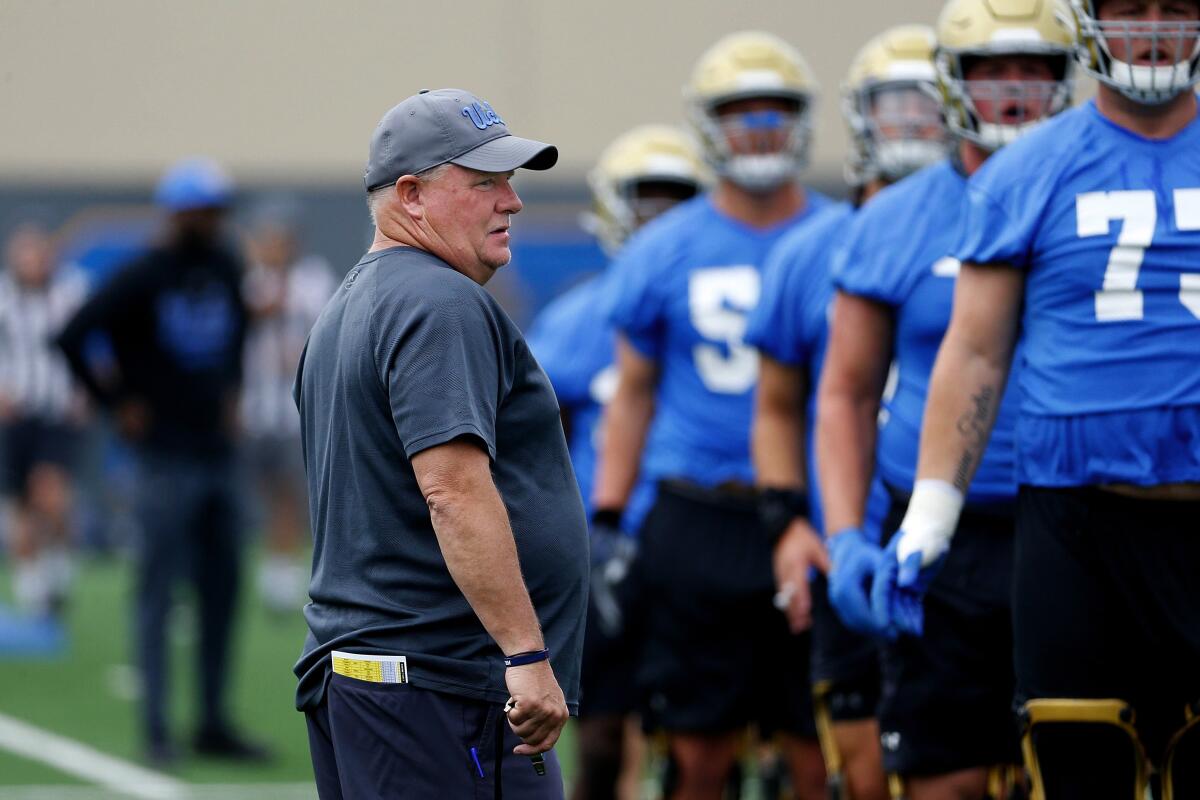
All around them, the deadly virus continues to spread. Twenty-nine states reportedly have set records this month for increases in new COVID-19 cases. In Los Angeles County, schools and nonessential businesses remain closed as part of health officials’ top tier of restrictions.
Meanwhile, the UCLA football players’ “Bruin Bubble” has remained intact.
UCLA has not reported a positive COVID-19 test in its athletic community since Oct. 2, when school officials announced that a member of the track and field team had tested positive for the disease. The last positive test pertaining to a football player was announced more than a month ago, on Sept. 25.
As of late last week, the school had conducted 4,415 tests among athletes, coaches and staff, resulting in 16 positive (0.36%) results. It’s a success story by any measure as the Bruins attempt to avoid the viral surges that have shut down football practices elsewhere and canceled or postponed scores of games.
“We all live day to day,” UCLA coach Chip Kelly said Monday, “and in a COVID world, we live hour to hour.”
In an effort to mitigate the effect of players potentially testing positive for the coronavirus, UCLA players are practicing at different positions.
Players recently began rapid testing, and Kelly receives a report before practice each morning letting him know if anyone is unavailable. Defensive lineman Steven Mason spent time in quarantine after coming in contact with someone outside the athletic community who tested positive, and another unnamed player was asked to stay home with a symptom thought to be possibly related to COVID-19.
Kelly said his team has benefited from a low number of cases in Westwood, but there’s more than luck involved in preventing transmission. School officials have reduced the potential for viral spread by staggering the times players enter the Wasserman Football Center and by housing the entire team in the same apartment complex on Gayley Avenue.
“We’re isolated from a bunch of other students and being in a bunch of buildings around a ton of faces,” receiver Chase Cota said. “So I think that helps a lot.”
It might be the perfect setup if the Bruins never had to leave campus. But the success of staging a season will also hinge on their opponents’ ability to ward off the virus.
In Boulder, Colo., where UCLA is scheduled to open the season against Colorado on Nov. 7, public health officials only recently eased restrictions that had barred college-aged adults from gathering in groups of more than six. Oregon, another opponent on the Bruins’ early schedule, canceled a scrimmage over the weekend after five players tested positive for the virus, though follow-up testing revealed those results had been false positives.
A one-year eligibility extension approved by the NCAA and a potential transfer rule could leave college football rosters in flux for a few seasons.
The lingering uncertainty has left the Bruins wondering how many games they will get to play on a seven-game, conference-only schedule.
“My confidence is, I don’t have any confidence,” Kelly said, “just because this virus can attack at any time and any place and you can just look at all the people as far as teams getting infected, so I don’t know if you can ever drop your guard.”
Backup battle
Kelly said Parker McQuarrie was part of the race to become quarterback Dorian Thompson-Robinson’s top backup, describing the 6-foot-6, 223-pound freshman as a “big, tall, strong kid” with a good release and accurate throwing abilities.
But Kelly intimated that McQuarrie could be at a disadvantage going against redshirt freshmen Chase Artopoeus and Chase Griffin because McQuarrie is new to major college football after having graduated from a prep school in New Hampshire.
“Obviously coming from a smaller high school, picking up what we’re doing is a little different than maybe what he did,” Kelly said, “but he’s been really good and that part has been impressive in how quickly he’s picked up what we’re doing.”
Kelly said the biggest challenge in preparing his backup quarterbacks was getting them enough repetitions during training camp. The coach said he split snaps evenly between first- and second-string players and would give the second-stringers 40% of repetitions during game-week preparations for the opener against Colorado to ensure they felt prepared should they be needed against the Buffaloes.
Colson Yankoff entered UCLA’s camp as a backup to the Pac-12 Conference’s most experienced quarterback. Now, he’s jockeying for playing time as a receiver.
The likelihood of a backup quarterback playing this season is high given that Thompson-Robinson missed one game last season and was knocked out of parts of three others because of injuries. What’s Kelly’s confidence level that a backup could get the job done if necessary?
“I’m confident,” Kelly said, “just because we don’t have any other options.”
Old man Fernea
The No. 36 jersey that redshirt senior receiver Ethan Fernea was awarded last year as a tribute to the late Nick Pasquale for being the team’s most inspirational walk-on will be given to another player after Fernea’s departure, though that might be a while longer than expected.
Fernea said he was considering capitalizing on the NCAA’s eligibility extension that would allow him to stay for a sixth season in 2021.
“I’d be pretty old,” Fernea cracked. “But yeah, you know, I love football [and] I think I want to play football as long as I possibly can. So if that’s the best option to keep playing football, then absolutely.”
Etc.
UCLA’s game against Colorado will start at 4 p.m. Pacific time and be televised on ESPN2.
More to Read
Go beyond the scoreboard
Get the latest on L.A.'s teams in the daily Sports Report newsletter.
You may occasionally receive promotional content from the Los Angeles Times.

